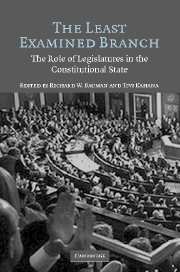Book contents
- Frontmatter
- Contents
- Foreword: Legislatures in the Constitutional State by Amy Gutmann
- Contributors
- New Ways of Looking at Old Institutions
- PART ONE LEGISLATURES AND DEMOCRATIC THEORY
- PART TWO LEGISLATING AND DELIBERATING IN THE DEMOCRATIC LEGISLATURE
- PART THREE CONSTITUTION MAKING BY LEGISLATURES: THE EXPLICIT VERSION
- PART FOUR CONSTITUTION MAKING BY LEGISLATURES: THE IMPLICIT VERSION
- PART FIVE CONSTITUTIONAL INTERPRETATION AND APPLICATION BY THE LEGISLATURE
- 16 Interpretation in Legislatures and Courts: Incentives and Institutional Design
- 17 Constitutional Engagement “Outside the Courts” (and “Inside the Legislature”): Reflections on Professional Expertise and the Ability to Engage in Constitutional Interpretation
- 18 Legislatures as Constitutional Interpretation: Another Dialogue
- 19 The Constitution and Congressional Committees: 1971–2000
- PART SIX IS LEGISLATIVE CONSTITUTIONALISM POSSIBLE?
- PART SEVEN THE LEGISLATURE IN DIALOGUE: DOMESTIC AND INTERNATIONAL CONTEXTS
- Index
17 - Constitutional Engagement “Outside the Courts” (and “Inside the Legislature”): Reflections on Professional Expertise and the Ability to Engage in Constitutional Interpretation
Published online by Cambridge University Press: 06 August 2009
- Frontmatter
- Contents
- Foreword: Legislatures in the Constitutional State by Amy Gutmann
- Contributors
- New Ways of Looking at Old Institutions
- PART ONE LEGISLATURES AND DEMOCRATIC THEORY
- PART TWO LEGISLATING AND DELIBERATING IN THE DEMOCRATIC LEGISLATURE
- PART THREE CONSTITUTION MAKING BY LEGISLATURES: THE EXPLICIT VERSION
- PART FOUR CONSTITUTION MAKING BY LEGISLATURES: THE IMPLICIT VERSION
- PART FIVE CONSTITUTIONAL INTERPRETATION AND APPLICATION BY THE LEGISLATURE
- 16 Interpretation in Legislatures and Courts: Incentives and Institutional Design
- 17 Constitutional Engagement “Outside the Courts” (and “Inside the Legislature”): Reflections on Professional Expertise and the Ability to Engage in Constitutional Interpretation
- 18 Legislatures as Constitutional Interpretation: Another Dialogue
- 19 The Constitution and Congressional Committees: 1971–2000
- PART SIX IS LEGISLATIVE CONSTITUTIONALISM POSSIBLE?
- PART SEVEN THE LEGISLATURE IN DIALOGUE: DOMESTIC AND INTERNATIONAL CONTEXTS
- Index
Summary
The topic of this section is “constitutional engagement by legislatures.” This almost inevitably suggests that the legislature – although it is obviously a nonjudicial institution – can legitimately play a meaningful role in interpreting its particular national constitution. Should the legislature in question be a “parliament,” then, of course, we need not speak of concomitant “executive” engagement because the executive, in a parliamentary system, is him- or herself a parliamentarian. In a “presidentialist” system like that of the United States, however, where a politically independent “chief executive” coexists with the legislature – and, of course, the judiciary – the question of nonjudicial “engagement” is necessarily broader. In any event, because of my own background as an American constitutional lawyer, I shall be discussing the extent to which both Congress and the executive can serve as independent constitutional interpreters. My major theoretical concerns, however, do not depend on the particularities (and peculiarities) of the American political system, and I certainly hope that my arguments will be relevant across national boundary lines and across political systems.
My focus in this brief chapter is the capacity of nonlawyer members of legislatures (or, for that matter, any other branch of government or, ultimately, ordinary citizens themselves) to engage in constitutional interpretation. Perhaps an even deeper question is whether constitutional interpretation requires professional training, which would, among other things, mark off the enterprise as significantly “esoteric,” or is it indeed something that can be engaged in by ordinary, nonprofessionally trained men and women?
- Type
- Chapter
- Information
- The Least Examined BranchThe Role of Legislatures in the Constitutional State, pp. 378 - 384Publisher: Cambridge University PressPrint publication year: 2006
- 1
- Cited by



